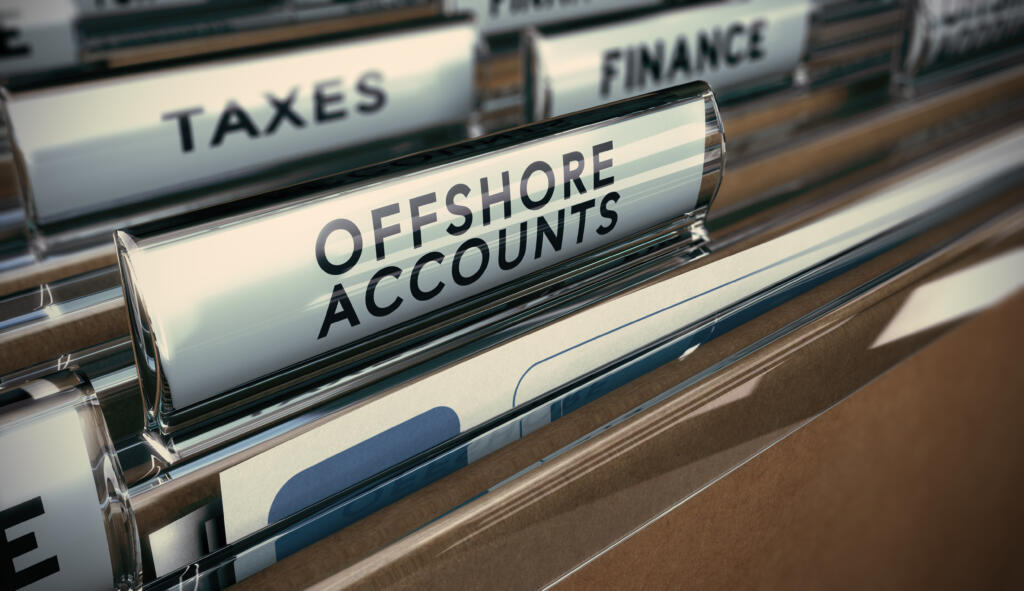When you think of offshore banking, you probably think about high-level wealth and financial secrecy. But offshore banking isn’t as complex as you might assume – and it can actually offer quite a few perks. With an online search right now, you could actually open an offshore bank account yourself.
Offshore banking is the process of opening and using a bank outside of your home country. It includes international banks, international investing, and international customers. And you can search online to find offshore bank accounts that offer all the benefits of traditional U.S.-based bank accounts and more.
 Olivier Le Moal / Shutterstock
Olivier Le Moal / ShutterstockHere are four facts everyone should know about offshore bank accounts.
1. Offshore Bank Accounts Are Legal
You probably assumed offshore bank accounts are illegal. After all, these international accounts get a lot of attention for being suspicious, involved in tax evasion, and for wealthy people trying to avoid the government’s prying eyes.
However, while some people use offshore bank accounts to hide money and perform illicit activity, they’re in the minority¹. Offshore banking doesn’t have to be illegal. In fact, there’s nothing stopping you from opening an offshore bank account.
Offshore banking is perfectly legal². Anyone can participate. You can open a bank account in countries like Bermuda, Switzerland, Dublin, Belize, or even Canada. Each offshore bank and foreign country will have its own banking requirements, just like in the U.S. – but with a little research, you can find out what’s required to legally open an account³.
Just make sure you’re also up to date with current tax law. You don’t want to worry about failing to report your offshore bank accounts come tax season.
2. Offshore Banking Offers a Number of Unique Benefits
When you open an offshore bank account, you can get access to perks you’d never find at your local bank. International bank accounts offer unique benefits that are worth taking advantage of in certain financial situations.
The benefits of offshore banking include⁴:
- Asset Protection. If you’re worried about protecting your assets, particularly in the event of legal issues or lawsuits, an offshore bank can help. It can also protect government agencies from freezing your assets.
- Diversification. Placing your money into an offshore bank allows you to hold a foreign currency, which can diversify your financial portfolio. It can do this with different funds, different purchasing power, and internationalized savings.
- High Interest Rates. You could collect more interest on your money thanks to higher interest rates on offshore bank accounts. You may be able to find banks that pay much higher rates than U.S. banks.
Look into the specifics of each international bank you’re interested in to see if there are even more perks to opening an account.
3. Offshore Banks Can Offer More Privacy and Protection
If you need extra privacy when it comes to your finances, an offshore bank can provide that, particularly if you have less than $10,000 in your bank account.
If you have a total of $10,000 or more in foreign bank accounts, you must report it to the IRS. However, if you have less than $10,000 in foreign accounts and aren’t using a trust or LLC, you don’t necessarily need to report these funds⁵. You can check with a tax professional to determine how much money you need to report and how much you can keep to yourself.
Additionally, offshore bank accounts can provide you with increased protection. They’re particularly beneficial when governments go bankrupt, as your money will be secure in another country’s banking system⁶. This can protect your funds and ensure that you’re able to get your money when you need it in a crisis.
4. Offshore Bank Accounts Can Offer Stability in a Recession
During periods of financial instability, like a recession, an offshore bank account can be a handy thing to have.
During the 2009 Great Recession, more than 370 banks failed⁷. Many were in the U.S., but banks in countries like Germany, Australia, and Panama also failed. Anyone whose money was in those banks faced a serious crisis. And although the U.S. FDIC insures up to a certain amount of money, bank failures and financial crises can leave you very worried about your money.
Foreign banks can take fewer risks than U.S. banks, and you won’t have to worry about failures or collapses⁸. You can find safe, stable banks that will protect your assets, allowing you to keep more of your money when trouble arises.
If you’re concerned about a recession, serious financial crisis, or financial instability, an offshore bank account can help you move your money somewhere that’s more stable.
How to Take Advantage of Offshore Banking
Is offshore banking the right move for your money? It could be. For many people, and in many uncertain situations, moving your money into an international bank account can be a good idea. But before you take action, it’s important to do your research.
In order to find an offshore bank account, you’ll need to search for international bank accounts that accept U.S. customers and funds. Search online to find these banks, and make sure to look into their requirements. You can compare the banks and the types of accounts they offer. You should also search for reviews and insight into how these banks work with international customers.
Once you’ve searched for and compared multiple offshore banks, you can take the first steps towards opening a new account.


